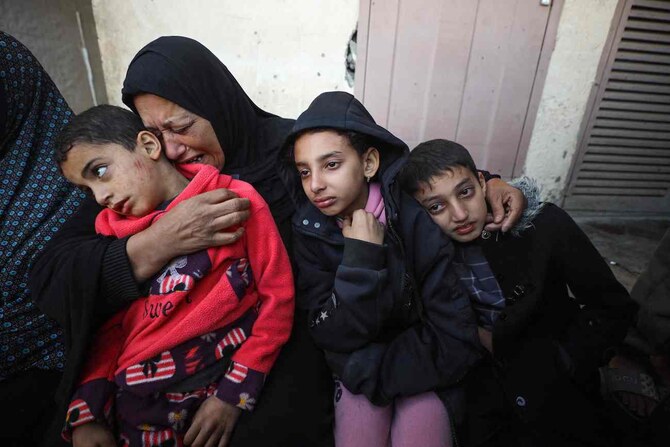DOHA/CAIRO/JERUSALEM, Jan 14 : Negotiators met in Qatar on Tuesday hoping to hammer out final details of a ceasefire in Gaza, with mediators and the warring sides all describing a deal as closer than ever.
More than six hours after talks began there was still no word on an outcome.
Qatar’s foreign ministry spokesperson Majed Al-Ansari told a news conference that talks on the final details were underway after both sides were presented with a text. US President Joe Biden, whose administration has been taking part alongside an envoy of president-elect Donald Trump, said a deal was close.
Hamas said the talks had reached the final steps and that it hoped this round of negotiations would lead to a deal after mediation by Qatar, Egypt and the United States.
An Israeli official said talks had reached a critical phase although some details needed to be hammered out: “We are close, we are not there yet.”
Militant group Islamic Jihad, which is separate from Hamas and also holds hostages in Gaza, said it was sending a senior delegation that would arrive in Doha on Tuesday night to take part in final arrangements for a ceasefire deal.
“The deal ... would free the hostages, halt the fighting, provide security to Israel and allow us to significantly surge humanitarian assistance to the Palestinians who suffered terribly in this war that Hamas started,” Biden said on Monday.
If successful, the phased ceasefire — capping over a year of start-and-stop talks — could halt fighting that decimated Gaza, killed tens of thousands of Palestinians, made most of the enclave’s population homeless and is still killing dozens a day.
That in turn could ease tensions across the wider Middle East, where the war has fueled conflict in the West Bank, Lebanon, Syria, Yemen and Iraq, and raised fears of all-out war between Israel and Iran.
Israel would recover around 100 remaining hostages and bodies from among those captured in the Oct. 7, 2023 attacks by Hamas that precipitated the war. In return it would free Palestinian detainees.
US Secretary of State Antony Blinken, who gave a speech in Washington outlining a vision for governing the Palestinian territories after the war, said it was up to Hamas to accept a deal that was already set for implementation.
Families of hostages in Israel were on edge. Meirav Leshem Gonen, whose 24-year-old daughter Romi was shot and seized by gunmen at a music festival, told Radio 103 the family had been picturing her return for months as “the light at the end of the tunnel.”
“We have to keep our feet on the ground. But on the other hand our heads are in the clouds.”
An Israeli official said the deal’s first stage would see the release of 33 hostages, including children, women including some female soldiers, men above 50, and the wounded and sick. Israel would gradually and partially withdraw some of its forces.
A Palestinian source said Israel would free 1,000 Palestinian prisoners in the first phase, which would last 60 days.
Families of hostages unlikely to be in the first group remained anxious. As Prime Minister Benjamin Netanyahu briefed relatives of some hostages, others protested outside his office.
“The prime minister should bring a deal that includes all the hostages, including my son,” said Ruby Chen, whose soldier son, Itay, was killed on Oct. 7, 2023, his body since held in Gaza. “He saved many people, he doesn’t deserve to rot in Gaza.”
FIGHTING STILL RAGES
Israel launched its assault in Gaza after Hamas-led fighters stormed across its borders on Oct.7, 2023, killing 1,200 people and taking more than 250 hostages, according to Israeli tallies.
Since then, Israeli forces have killed more than 46,000 Palestinians in Gaza, according to Palestinian health officials.
Only one ceasefire has been held so far, lasting for a single week in Nov. 2023, during which around half of the hostages, including most women, children and foreign laborers, were freed in return for Palestinian detainees.
Both sides have been committed in principle for months to the prospect of a ceasefire accompanied by a swap of remaining hostages for detainees. But previous talks foundered over the steps that would follow, with Hamas rejecting any deal that stopped short of bringing a permanent end to the war, while Israel said it would not end the war until Hamas is dismantled.
Fighting has meanwhile raged on, focused in recent months on Gaza’s northern edge where Israel says its forces are trying to prevent Hamas from regrouping and Palestinians say the Israelis are trying to permanently depopulate a buffer zone. Nightly Israeli strikes have continued across the enclave.
Gaza health officials said on Tuesday Israeli strikes killed at least 27 Palestinians in the past day, including one Gazan journalist. One of those attacks killed 10 people in a house in Khan Younis south of the enclave. Another killed nine people in a tent encampment in Deir Al-Balah in central Gaza.
Trump’s Jan. 20 inauguration is now widely seen as a de facto deadline for a ceasefire agreement. Trump has said there would be “hell to pay” unless hostages held by Hamas are freed before he takes office, while Biden has also called for a final push for a deal before he leaves.


























